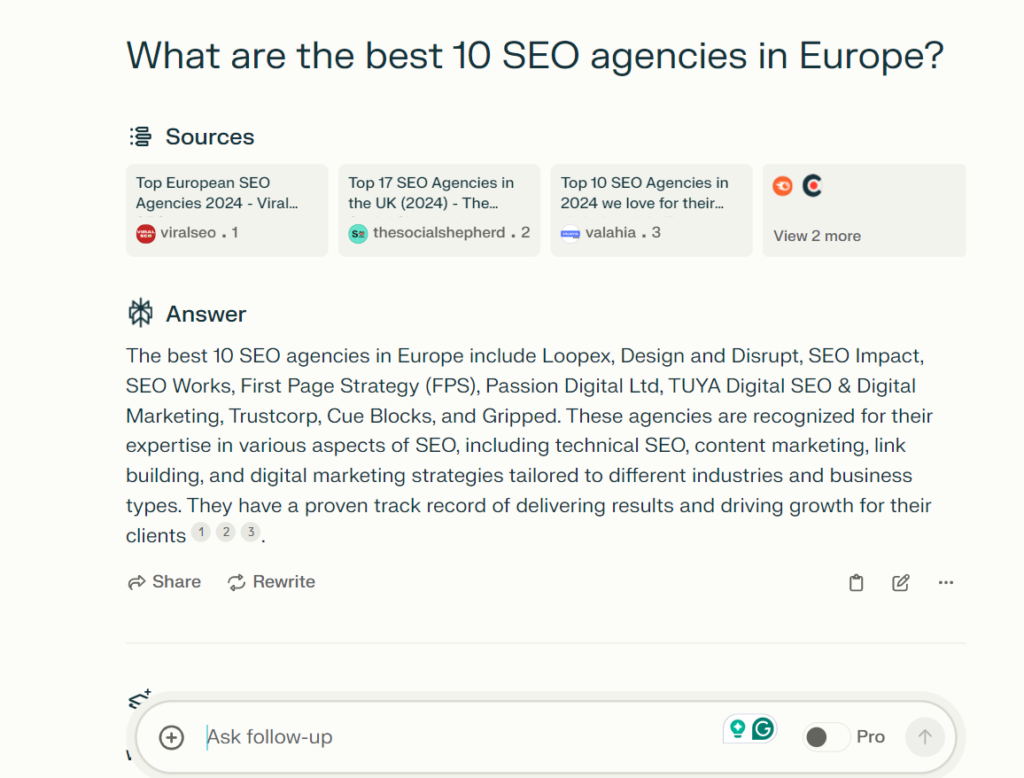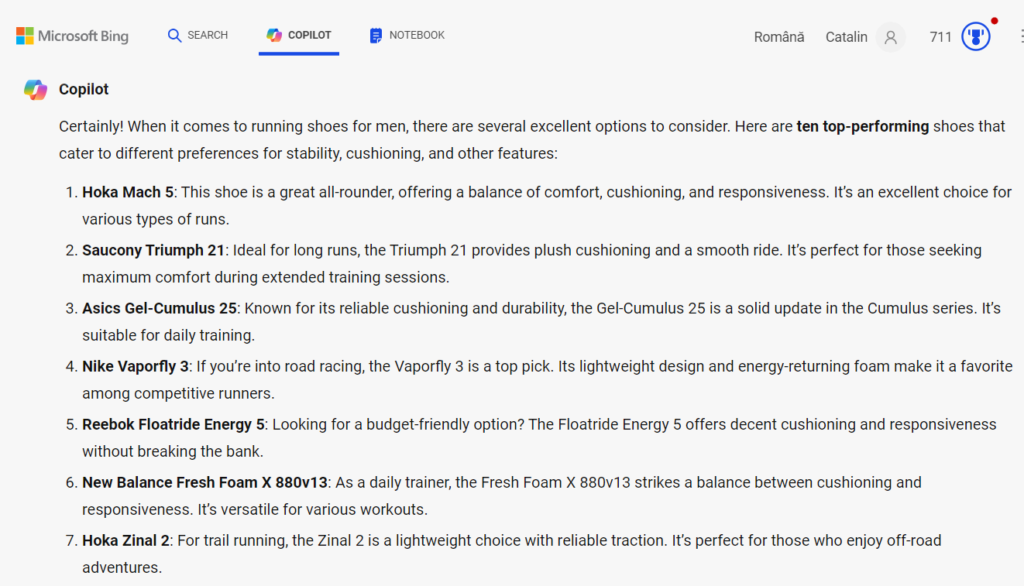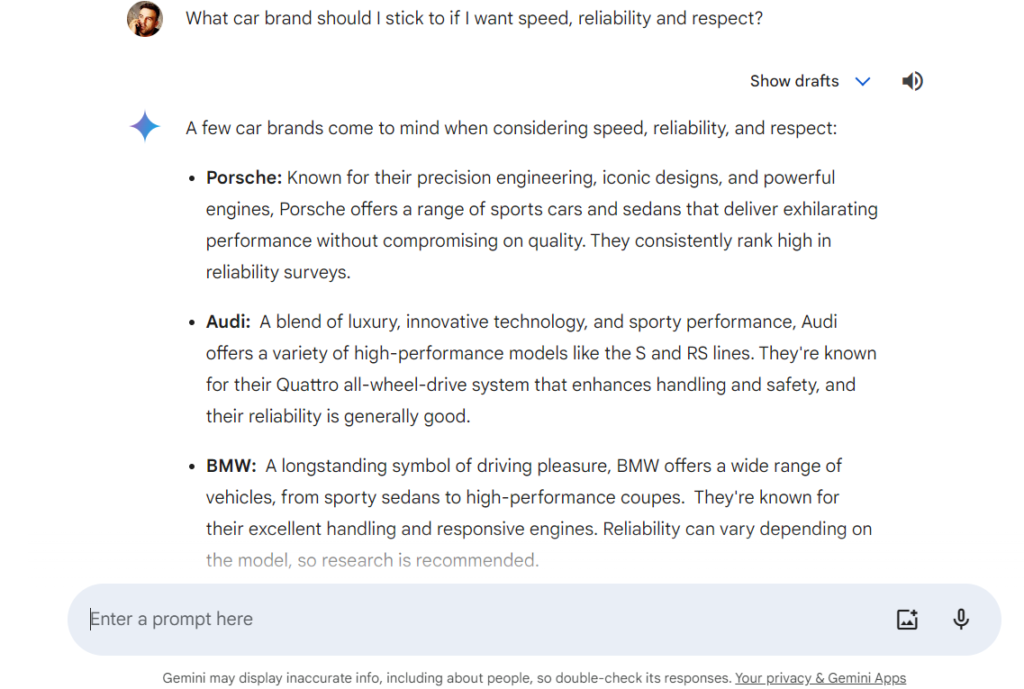The digital world is a whirlwind of innovation, and search engines are no exception. While Search Engine Optimization (SEO) has reigned supreme for years, a new frontier beckons: Generative Engine Optimization – GEO. This article delves deep into the world of GEO, exploring its core principles, contrasting it with SEO, and outlining actionable strategies to optimize your website for the generative search revolution.
Those who read this article are probably interested in SEO, have heard about GEO, and want to learn what Generative Engine Optimization is. This is why we’ll try to explain what GEO is like talking to an SEO professional or enthusiast.
Generative Engine Optimization is SEO combined with AI. It is not only applying AI for SEO; there is more to it than that.
GEO is about optimizing content to be favoured by AI and picked up in generative engine results or answers because generative engines are not about a results feed but about answers or a single comprehensive answer with sources mentioned.
Generative Engine Optimization – GEO: What Is GEO And What Are Generative Engines

First, let’s understand Generative Engines. Imagine a search engine that doesn’t just display links but crafts informative, comprehensive responses directly within the search results page. This is the essence of generative engines powered by sophisticated Artificial Intelligence (AI) and machine learning algorithms.
These generative engines go beyond keyword matching; they analyze vast amounts of data, synthesize information from various sources, and generate human-quality text tailored to the user’s query.
One of these engines is Perplexity, one of the latest arrivals in this market. Instead of searching on Google, the users will search on Perplexity. Let’s see how results are displayed in Perlplexity:

The same Perplexity offers a similar answer to another question – What are the best SEO agencies in Europe?

Well done, Perplexity and thank you for including TUYA Digital in both rankings! Or, better said, well done, TUYA Digital, for the excellent work in Generative Engine Optimization!
Yes, there is a strong connection between what generative engines offer as a result of specific queries and the SEO work done to optimize for those specific queries. GEO is more than SEO, requiring even more knowledge and skills.
Are you ready to start grasping the gist of GEO?
GEO VS SEO – Main Differences
Whereas SEO optimizes websites for traditional search engines like Google and Bing, GEO focuses on optimizing content for these AI-driven generative engines. In other words, while SEO is creating and optimizing content primarily to be ranked higher in SERPs, GEO is about creating and optimizing your content for the generative engines to pick you up as a source in their answers. By mentioning your brand as a source, chances are the generative engines also take your content, at least partially, and include it in the answers to queries.
Here’s a breakdown of the key differences:
- Target Audience: SEO plays to the strengths of traditional search engines, aiming for high rankings on SERPs. Conversely, GEO optimizes content for generative engines that are still developing but hold immense potential.
- Content Strategy: The SEO playbook involves strategic keyword placement and building backlinks. While these elements might still hold weight in GEO, the emphasis shifts towards providing well-structured, informative content that caters to the specific needs of AI engines.
- Focus: SEO strives to get your website on the first page of search results. GEO aspires to ensure generative engines use your content to craft informative answers for user queries.
As we have seen earlier, GEO and SEO are strongly connected. Yet, some differences exist, and SEOs, now wannabe GEO professionals, need to understand.
Here’s a table summarizing the key differences between GEO and SEO:
| Feature | SEO | GEO |
| Target Audience | Traditional Search Engines (Google, Bing) | Generative Engines (AI-powered, under development) |
| Content Strategy | Keyword Focus, Backlinks | Informative Structure, Data & Citations |
| Focus | High Ranking on SERPs | Content Used in Generative Engine Responses |
However, maybe the best way to understand the difference between search engines and generative engines is to use Bing. This is where you see search results and generative results.
It is something like this:



Bing is fully integrated with ChatGPT-4 power capabilities, and ChatGPT supplies the generative results and feeds its AI brain with the information it finds in Bing. So, chances are, if you know how to optimize for Bing, you’re halfway into the GEO. Yet, there’s more to it than that.
Google’s Search Generative Experience
The giant search engine Google sensed the danger of generative engines years ago. The mighty search giant introduced Search Generative Experience – SGE in 2023. Google Search Generative Experience SGE is an experimental version of Google’s search engine that uses AI to provide more relevant and comprehensive results to users’ inquiries. This revolutionary feature is part of a program called Search Labs, Google’s testing ground for pioneering technological enhancements to its search engine. Users can opt into these experiments, gaining early access to innovations like SGE, Code Tips, and Add to Sheets.
It was a first admission that SEO is no longer enough and that SEO specialists should acquire new skills: generative search optimization, or GEO.
Now, Gemini is trying to pick up the pace and not be left behind by generative engines in an era when searches will become increasingly automated.
GEO Case Study: The Rise Of Bard (Google AI), Now Gemini
One prominent example of a generative engine is Bard (currently Gemini), a large language model developed by Google AI.
Bard could generate different creative text formats, like poems, code, scripts, musical pieces, emails, letters, etc., and answer your questions in an informative way, even if they are open-ended, challenging, or strange.
While Bard, currently Gemini, was not a mainstream search engine, it showcases the potential of generative search and the need for SEO professionals to adapt their strategies.
But Gemini does more than search for quick answers now. Either way, when users search for information in your industry, they should find your brand there. Otherwise, it’s called you are not optimized for Generative Engines.

While Porsche might not be the apparent reliable choice, it comes on top of Audi and BMW in generative searches for “speed, reliability and respect.” Again, it might not be the obvious choice, but the generations using generative engines will pick up this answer.
BMW, do you want to top Porsche for this query? Make your marketing team work for GEO – Generative Engines Optimization!
GEO Optimizing Your Website: Best Practices
The field of GEO is still evolving, but you can take proactive steps to prepare your website for the future:
GEO Is About Embracing Authoritativeness
Generative engines may prioritize content from established sources. Build trust by showcasing your expertise. Include affiliations, relevant credentials, and links to credible sources to establish yourself as a thought leader in your field. Reputation management is critical here!
Example: If you’re a website about sustainable gardening practices, include links to university research papers and certifications from relevant organizations. This makes you more credible for the audience and the generative engines. As you can see in the figures above, Perplexity offers links to sources, and Bing does precisely the same. Below is an answer to “The best shoe brands to run a marathon,” which Bing’s Copilot displays. Notice the way the sources of the information are displayed below the answer.

If you want to understand why, it is simply because no one trusts AI 100% yet, so the generative search engines have to display their answer or results and where the AI extracted the information from. So, it is a good idea to build your reputation if you want your brand to be cited and mentioned in generative results.
The Structure Is Key In GEO
Provide clear and well-organized content. Use headings, subheadings, bullet points, and numbered lists to make information easily digestible for AI algorithms. This will improve human readability and make it easier for generative engines to parse and utilize your content.
- Example: Break down complex topics into smaller sections with clear headings. Use bullet points to highlight key takeaways or steps in a process.
Data Is King In GEO As Well
Support your claims with statistics, research findings, and other data points. Generative engines may favour content that demonstrates a solid factual basis.
- Example: Don’t just say, “Composting is good for the environment.” Instead, cite research showing how composting reduces greenhouse gas emissions and improves soil health.
Do you want to rank well in Generative Engines? Ensure your content is consistent, supported by data and backlinked from various sources.
Embrace Diverse Content Formats In Generative Optimization
Generative engines may process various content formats differently. Experiment with text, images, and infographics to see what resonates best.
- Example: If you have a blog on travel destinations, consider incorporating high-quality photographs and videos alongside your written content.
SEO Specialists have been saying this for ages: start creating not only written content but also videos, infographics, and charts. This sort of content is loved by Google and the generative engines, which love data. And data means more than writing beautifully crafted texts about the weather.
Stay Updated With The Latest Generative Engine Optimization News
The field of generative search is constantly evolving. Monitor industry trends and research papers from institutions like https://allenai.org/ and adapt your GEO strategy accordingly.
- Example: Follow industry publications and attend conferences focused on AI and search engine
We will discuss the best practices in GEO in a separate article.
Challenges And Opportunities In Generative Engine Optimization
The world of GEO is brimming with both challenges and opportunities for website owners and content creators:
Challenges In GEO
- Evolving Landscape: Generative engines are still under development, and their exact algorithms are not fully disclosed. This makes it difficult to pinpoint a foolproof GEO strategy.
- Data Bias: AI algorithms can perpetuate biases in the data they are trained on. Ensuring your content is factually accurate and avoids perpetuating stereotypes is crucial.
- Content Quality: Generative engines may require higher content quality than traditional search engines, which may necessitate more resources dedicated to content creation.
Opportunities In GEO
- Early Mover Advantage: By implementing GEO strategies now, you can establish yourself as a trusted source for generative engines, potentially leading to a competitive edge.
- Reaching New Audiences: Generative engines may personalize search results based on user data. This could open doors to reaching niche audiences or users with specific interests.
- Enhanced User Experience: Content optimized for generative engines may lead to more informative and comprehensive answers for users, ultimately enhancing the search experience.
Embracing The Generative Future: Start Learning And Applying Generative Engine Optimization
The rise of generative search engines presents a paradigm shift in the digital landscape. While SEO remains crucial, incorporating GEO principles into your content strategy can prepare your website for the future. By focusing on authoritativeness, clear structure, data-driven content, and diverse formats, you can be readily utilized by generative engines to reach a wider audience. The future of search is taking shape, and those who embrace GEO stand a chance to become pioneers in this exciting new era.
Additional Considerations On GEO Optimization – Instead Of A Conclusion
- This article is optimized for various search terms related to GEO, SEO, and generative engines. It incorporates relevant keywords throughout the text and uses subheadings to improve readability.
- Consider including internal links to relevant pages on your website that expand on specific topics mentioned in this article. This can further enhance your website’s authority and user experience.
- Stay current on the latest research and developments in generative search. This knowledge can help you refine your GEO strategy over time.
By implementing these tips and staying informed, you can navigate the ever-changing digital landscape and thrive in the age of generative search.
So, SEO is no longer enough. It would be best if you considered generative engines as well. Generative Engine Optimization should be a standard offer to any current SEO and GEO agencies appearing in the coming months and generate competition with current digital marketing agencies.
